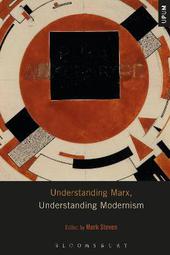
|
Understanding Marx, Understanding Modernism
Hardback
Main Details
Description
A concentrated study of the relationships between modernism and transformative left utopianism, this volume provides an introduction to Marx and Marxism for modernists, and an introduction to modernism for Marxists. Its guiding hypothesis is that Marx's writing absorbed the lessons of artistic and cultural modernity as much as his legacy concretely shaped modernism across multiple media.
Author Biography
Mark Steven is Senior Lecturer in Twentieth- and Twenty-first Century Literature at the University of Exeter, UK. He is the author of Red Modernism: American Poetry and the Spirit of Communism (2017) and Splatter Capital (2017).
ReviewsUnderstanding Marx, Understanding Modernism provides the initiate and veteran scholar alike with an excellently curated selection of essays addressing the bound development of historical materialism and modernist cultural production. Both ecumenical and precise in their arguments and readings, the interventions in Understanding Marx, Understanding Modernism are indispensable contributions to the field of politics and art. * Ruth Jennison, Associate Professor of English, University of Massachusetts, Amherst, USA * Sidestepping dogmatic readings of Marx and formalist modes of modernist studies, this thoughtfully arranged volume expands and clarifies a growing collective understanding of what Marxism and literature have to do with each other. Deeply knowledgeable and finely argued, the essays collected here not only provide support and explication for students of Marxism and modernism, but also draw on new and submerged understandings of Marx's work to outline the capaciousness of Marxian methods for scholars of literature and culture. * Amy De'Ath, Lecturer in Contemporary Literature, Culture and Theory, King's College London, UK * This discerningly assembled volume offers a coherent yet never monolithic picture of what Marx meant, and did not mean, to modernist practitioners across the arts. It also illuminates pressures and presences in Marx's writings ranging from Epicurean philosophy to the fortunes of the Paris Commune and clarifies key Marxian terms in glosses as precise as they are economical. The component entries stand on their own, but those who read from beginning to end will be rewarded with a deepened sense of how literariness, theory, and history interfused in key writings and movements in the arts before and after 1900. * Douglas Mao, Russ Family Professor in the Humanities, Johns Hopkins University, USA *
|